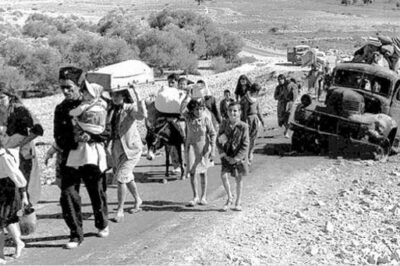Who are the Palestinian refugees? In only a few paragraphs, let me give you a brief and factual answer to this question.
In early 1948, there was a mass exodus of Arabs living in the region that is now known as Israel. Roughly 600,000 Arabs fled. The Palestinian propaganda machine has done a masterful job of convincing many that these refugees were forced out by Israelis. However, there is overwhelming historical proof that these Arabs left for other reasons.
The leaders of the surrounding Arab nations called on these Arabs to leave their homes. The plan was to come back after the conquest (see quotes at the end of this article) and you can check this out to review the reason for the exodus.
The British were planning on leaving on May 14, 1948. The next day, the Arabs would attack. Their plan was to win, and then the Arabs who had fled would be able to reclaim their homes and the Jewish homes around them (the thought was that the Jews would be dead). The problem was the major part of their plan did not work. Israel won the war.
The Israeli victory meant that these 600,000 Arabs were now homeless. Certainly Israel was not going to welcome them back into their new state. And the Arab nations who deceived them did nothing to help them. They simply spread them out and have kept them in refugee camps until today. By keeping them oppressed in these despicable refugee camps, the political issue stays alive.
As many as 140,000 Arabs fled from Israel to Gaza alone. When the war ended, Egypt controlled Gaza and turned it into a prison. Even Al-Jazeera, the openly pro-Arab, anti-Israel news outlet, recognized how poorly the Egyptians treated their Arab cousins.
Unlike the West Bank, which was effectively annexed by Jordan in 1950 and its population offered Jordanian citizenship, Egypt maintained Gaza under military rule until a legislative council was elected in 1957. Moreover, unlike Jordan, Egypt had little ties with or concern for Gaza, and thus the Strip received little attention or investment in infrastructure between 1948 and 1967.
For 15 years, everyone knew that the refugee situation was caused by the Arab leaders who had called on them to leave Israel. But in the 1960s, a fictitious account began to surface: The savage Jews drove the poor Arabs out of the Land. The goal was to take sympathy away from Israel (the ones who pleaded with the Arabs not to leave) and give it to the Arabs who fled (and planned to come back and destroy Israel and the Jews).
Mahmoud Abbas, the Palestinian prime minister, wants the refugees to be able to come back, not to a newly independent Palestinian state, but to Israel! The goal here is to strip Israel of its Jewishness. A total of 3.5 million Arabs coming to live in Israel (the original 600,000 has grown to that number) added to the present Arab population in Israel would essentially strip Israel of its status as the Jewish homeland.
To allow these Arabs and their families back, many of whom emotionally identify with the terrorist Arafat and believe that Israel has no right to exist, would make Israel 50 percent Arab and 50 percent Jewish.
Furthermore, David Ben Gurion, Israel’s first prime minister, pleaded with these people to stay in the new state. He guaranteed them citizenship and freedom. This excerpt from Ben Gurion’s speech, Israel’s declaration of Independence, could not be clearer:
“The Nation of Israel will ensure complete equality of social and political rights to all its inhabitants irrespective of religion, race or sex; it will guarantee freedom of religion, conscience, language, education and culture. We appeal, in the very midst of the onslaught launched against us now for months—to the Arab inhabitants of the State of Israel to preserve peace and participate in the upbuilding of the State on the basis of full and equal citizenship and due representation in all its provisional and permanent institutions.”
Still, they left, with the goal of returning to destroy Israel. To be redundant, their plan backfired when Israel defeated the invading Arab armies, thus creating the Palestinian refugee problem.
One must ask: “How did the Arab nations compensate those Palestinian Arabs who left their homes at the request of their leaders?” The answer is, they threw them in refugee camps all over the Middle East, made no effort to absorb them into their nations and economy and treated them like trash—while using them politically to show how vicious the Zionists are.
The cold, hard truth is that Israel has treated the Arabs of the West Bank and Gaza far better than Egypt or Jordan did. My friend Eli used to safely and regularly travel into Gaza after the Six-Day War (when Israel captured the Gaza Strip). In their minds, they had been liberated from oppression.
Israelis flooded into Gaza bartering at fruit stands, spending their shekels, supporting the Gaza economy. My wife, Elana, used to travel 15 minutes south to Gaza City with her father. It wasn’t until Arafat came into the picture that things got ugly.
And what did he bring his people? Bloodshed, oppression and a destroyed economy—while he himself became a billionaire! The fact is, Israel has done more to help the Palestinian Arabs to boost their standard of living than Arafat or any Arab nation.
FOOTNOTE: It is interesting that from 1948 to 1952 or so, history testifies that about 600,000 Jewish people immigrated to Israel. Most of these were from Arab nations like Iraq, Iran and Yemen. In Iraq alone, Jews were forced to leave behind $30,000,000,000 in assets. Maybe that money could have been used to help the 600,000 Arabs who left Israel.
Quotes from Arab Leaders Concerning the Palestinian Refugees
The following are a collection of historical quotations relating to the Arab refugees, collected by Moshe Kohn.
- On April 23, 1948, Jamal Husseini, acting chairman of the Palestine Arab Higher Committee (AHC), told the UN Security Council: “The Arabs did not want to submit to a truce … They preferred to abandon their homes, belongings and everything they possessed.”
- On September 6, 1948, the Beirut Daily Telegraph quoted Emil Ghory, secretary of the AHC, as saying: “The fact that there are those refugees is the direct consequence of the action of the Arab states in opposing partition and the Jewish state. The Arab states agreed upon this policy unanimously…”
- On June 8, 1951, Habib Issa, secretary-general of the Arab League, wrote in the New York Lebanese daily al-Hoda that in 1948, Azzam Pasha, then League secretary, had “assured the Arab peoples that the occupation of Palestine and of Tel Aviv would be as simple as a military promenade … Brotherly advice was given to the Arabs of Palestine to leave their land, homes and property, and to stay temporarily in neighboring fraternal states.”
- In a March 1976 issue of Falastin a-Thaura, then the official journal of the Beirut-based PLO, Mahmoud Abbas (“Abu Mazen”), PLO spokesman, wrote: “The Arab armies entered Palestine to protect the Palestinians from the Zionist tyranny but, instead, they abandoned them, forced them to emigrate and to leave their homeland, and threw them into prisons similar to the ghettos in which the Jews used to live.”
- On April 9, 1953, the Jordanian daily al-Urdun quoted a refugee, Yunes Ahmed Assad, formerly of Deir Yassin, as saying: “For the flight and fall of the other villages, it is our leaders who are responsible, because of the dissemination of rumours exaggerating Jewish crimes and describing them as atrocities in order to inflame the Arabs … they instilled fear and terror into the hearts of the Arabs of Palestine until they fled, leaving their homes and property to the enemy.”
- Another refugee told the Jordanian daily a-Difaa on September 6, 1954: “The Arab governments told us, ‘Get out so that we can get in.’ So we got out, but they did not get in.”
- The Jordanian daily Falastin wrote on February 19, 1949: “The Arab states… encouraged the Palestinian Arabs to leave their homes temporarily in order to be out of the way of the Arab invasion armies.”
- On October 2, 1948, the London Economist reported, in an eyewitness account of the flight of Haifa’s Arabs: “There is little doubt that the most potent of the factors [in the flight] were the announcements made over the air by the Arab Higher Executive urging all Arabs in Haifa to quit … And it was clearly intimated that those Arabs who remained in Haifa and accepted Jewish protection would be regarded as renegades.”
- The Prime Minister of Syria in 1948, Khaled al-Azem, in his memoirs, published in 1973, listed what he thought were the reasons for the Arab failure in 1948: ” … the fifth factor was the call by the Arab governments to the inhabitants of Palestine to evacuate it and leave for the bordering Arab countries … We brought destruction upon a million Arab refugees by calling on them and pleading with them to leave their land.”
- “Following a visit to refugees in Gaza, a British diplomat reported the following: ‘But while they express no bitterness against the Jews…they speak with the utmost bitterness of the Egyptians and other Arab states: ‘We know who our enemies are,’ they will say, and they are referring to their Arab brothers who, they declare, persuaded them unnecessarily to leave their homes.”
The above quotes were taken from eretzyisroel.org.








Leave a Comment
You must be logged in to post a comment.